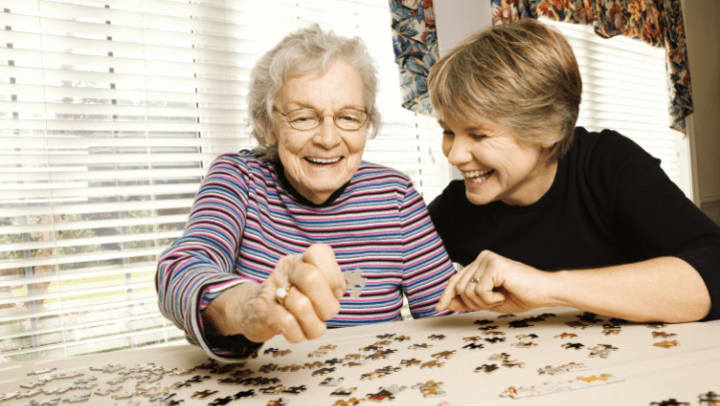Quality Alzheimer's care in Nichols Hills depends on how cognitive engagement affects your loved one's daily life. Research shows that memory care patients do better in settings that offer regular mental stimulation and individual attention.
Brain games and cognitive exercises do more than provide simple daily activities. These activities play a significant role in maintaining mental function and boosting the quality of life for Alzheimer's patients. With the proper guidance and planned activities, your loved one can make these exercises part of their daily routine.
Brain Games for Alzheimer's Care
Research shows that these mental exercises help maintain brain function and might slow down cognitive decline in people with Alzheimer's disease. The best brain games share standard features that help them work better. People should practice these activities at least three times a week for 30 minutes to see real improvements in thinking and memory. Games that challenge different mental skills at once work better than those focused on just one area.
Brain exercises that work well for memory care usually have:
-
Appropriate difficulty level - Activities should challenge the brain without becoming frustrating
-
Progression capability - Games that get harder as skills improve
-
Engagement factor - Exercises that keep people interested and motivated
-
Social component - Activities people can enjoy together since social interaction helps the brain function
Studies reveal that brain training at home without supervision doesn't improve thinking skills as much as programs with guidance and support.
Four Proven Brain Games for Memory Enhancement
Research has shown four brain games that boost memory function and cognitive abilities in people with dementia.
-
Word association and vocabulary games
Word puzzles give substantial cognitive benefits to Alzheimer's patients. People with dementia who keep taking crosswords and vocabulary exercises can delay their memory decline. These activities strengthen verbal learning, speed and memory while improving linguistic skills and focus. You might want to add:
-
Word searches to boost attention to detail
-
Anagrams to promote reasoning skills
-
Crossword puzzles to challenge memory recall
Adults over 50 who participate in word puzzles just once a month perform much better in all cognitive areas.
-
Number puzzles and mathematical challenges
Mathematical activities help brain health by growing new brain cells and strengthening neural connections. Dice games like Yahtzee and number puzzles like Sudoku help with numerical calculation skills that often decline with dementia. Number puzzles can:
-
Make short-term working memory better
-
Boost executive function
-
Build up attention and reasoning
People who solved number puzzles more than once daily showed cognitive performance equal to those eight years younger.
-
Visual memory exercises and pattern recognition
Pattern recognition exercises wake up the temporal lobe and improve analytical and spatial reasoning abilities. Jigsaw puzzles, with difficulty levels ranging from simple to sophisticated, help memory and reasoning especially well.
Your brain's ability to connect visual information with long-term memory links to higher intelligence levels. Visual exercises help people:
-
Spot recurring patterns
-
Create mental maps of their surroundings
-
Navigate better and stay oriented
-
Music-based cognitive activities
Music works remarkably well on the brain, even in advanced Alzheimer's cases. Patients often keep their musical abilities after language skills fade. Music therapy improves:
-
Verbal fluency and orientation
-
Self-awareness and consciousness
-
Autobiographical memory recall
Even new music boosts episodic memory in mild Alzheimer's patients. The therapy includes singing familiar songs, playing instruments or listening to individual-specific playlists. Daily routines with these four brain game types create effective cognitive stimulation for quality memory care.
Implementing Brain Games in Daily Care Routines
Brain games become more effective when you blend them naturally into daily routines. A well-laid-out routine helps people with Alzheimer's feel secure and reduces confusion. Studies show that planned days let caregivers focus more on involving patients than planning activities. To create a brain game schedule, think over the following:
-
The patient's peak energy times (most do better in the mornings)
-
A good mix of activity and rest periods
-
Set times for waking, sleeping and meals
-
3-4 weekly sessions of at least 30 minutes each to get the best results
Getting it right matters. Research shows that brain training with supervision leads to better cognitive improvements than home sessions alone.
Adapting games for different ability levels
You need to customize games to keep patients engaged without frustrating them. Games must change as Alzheimer's progresses. Start with simple versions and slowly make them more complex as comfort levels rise.
People with early-stage dementia might handle regular crosswords well. Later stages need word searches with more oversized print. Note that success builds confidence—adjust the difficulty so patients can win small victories instead of facing constant challenges.
Call Us for Guidance Today!
When implemented consistently, the right mix of activities leads to the best results. Each person responds uniquely to different forms of mental stimulation, such as word associations, number puzzles, visual exercises or music-based activities.
Our memory care specialists at Iris Memory Care of Nichols Hills can guide you through these cognitive care strategies. Call (405) 286-9500 today.
Brain games cannot stop Alzheimer's progression, but they are key to maintaining cognitive function. These activities create meaningful moments of connection. Your steadfast dedication to providing quality memory care significantly impacts your loved one's daily life.


